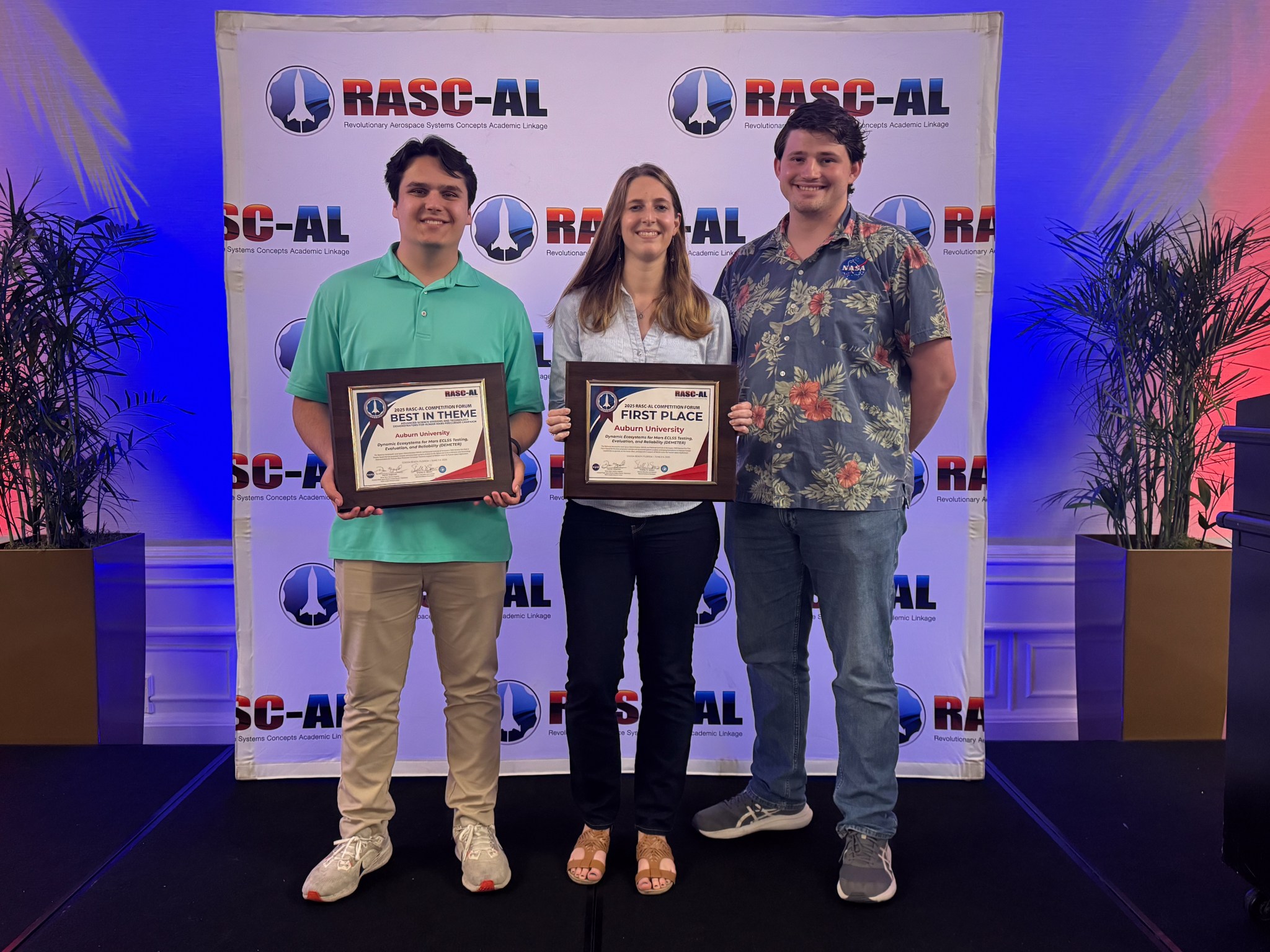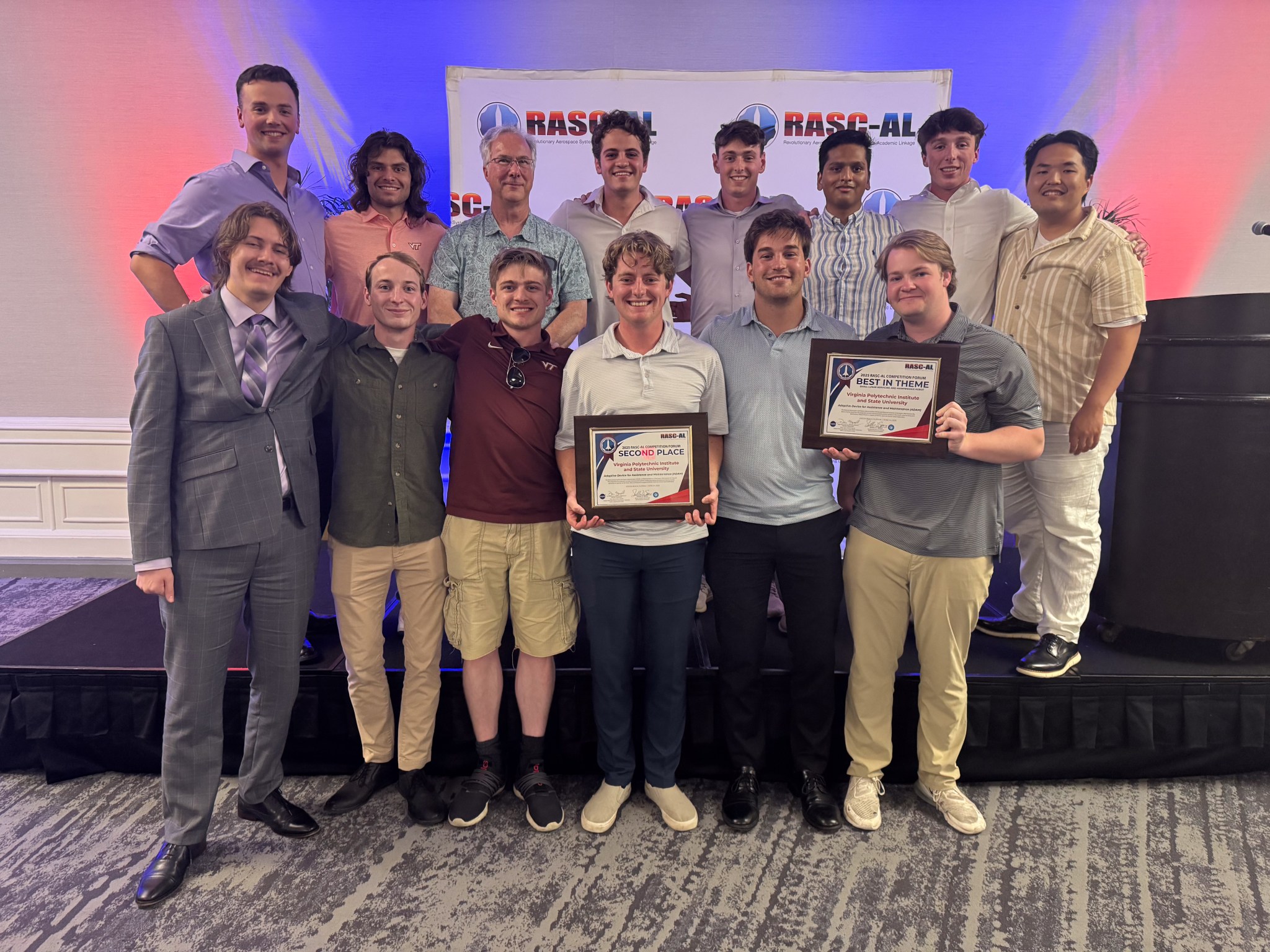4 min read

A team from Auburn University took top honors in NASA's 2025 Revolutionary Aerospace Systems – Academic Linkage (RASC-AL) Competition Forum, where undergraduate and graduate teams competed to develop new concepts for operating on the Moon, Mars and beyond.
Auburn's project, "Dynamic Ecosystems for Mars Environmental Control and Life Support Systems (ECLSS) Testing, Evaluation, and Reliability (DEMETER)" advised by Dr. Davide Guzzetti, took home top prize out of 14 Finalist Teams from academic institutions across the nation. Virginia Polytechnic Institute and State University took second place overall for their concept, "Adaptive Device for Assistance and Maintenance (ADAM)," advised by Dr. Kevin Shinpaugh. The University of Maryland took third place overall with their project, "Servicing Crane Outfitted Rover for Payloads, Inspection, Operations, N'stuff (SCORPION)," advised by Dr. David Akin, Nich Bolatto, and Charlie Hanner.
The first and second place overall winning teams will present their work at the 2025 AIAA Accelerating Space Commerce, Exploration, and New Discovery (ASCEND) Conference in Las Vegas, Nevada in July.

The RASC-AL Competition, which took place from June 2-4, 2025, in Cocoa Beach, Florida, is a unique initiative designed to bridge the gap between academia and the aerospace industry, empowering undergraduate and graduate students to apply their classroom knowledge to real-world challenges in space exploration. This year's themes included "Sustained Lunar Evolution - An Inspirational Moment," "Advanced Science Missions and Technology Demonstrators for Human-Mars Precursor Campaign," and "Small Lunar Servicing and Maintenance Robot."
"The RASC-AL Competition cultivates students who bring bold, imaginative thinking to the kinds of complex challenges we tackle at NASA," said Dan Mazanek, RASC-AL program sponsor and senior space systems engineer at NASA's Langley Research Center in Hampton, Virginia. "These teams push the boundaries of what's possible in space system design and offer new insights. These insights help build critical engineering capabilities, preparing the next generation of aerospace leaders to step confidently into the future of space exploration."
As NASA continues to push the boundaries of space exploration, the RASC-AL Competition stands as an opportunity for aspiring aerospace professionals to design real-world solutions to complex problems facing the Agency. By engaging with the next generation of innovators, NASA can collaborate with the academic community to crowd-source new solutions for the challenges of tomorrow.
Additional 2025 Forum Awards include:
Best in Theme: Sustained Lunar Evolution: An Inspirational Moment
- Virginia Polytechnic Institute and State University
- Project Title: Project Aeneas
- Advisor: Dr. Kevin Shinpaugh
Best in Theme: Advanced Science Missions and Technology Demonstrators for Human-Mars Precursor Campaign
- Auburn University
- Project Title: Dynamic Ecosystems for Mars ECLSS Testing, Evaluation, and Reliability (DEMETER)
- Advisor: Dr. Davide Guzzetti
Best in Theme: Small Lunar Servicing and Maintenance Robot
- Virginia Polytechnic Institute and State University
- Project Title: Adaptive Device for Assistance and Maintenance (ADAM)
- Advisor: Dr. Kevin Shinpaugh
Best Prototype: South Dakota State University
- Project Title: Next-gen Operations and Versatile Assistant (NOVA)
- Advisor: Dr. Todd Letcher, Allea Klauenberg, Liam Murray, Alex Schaar, Nick Sieler, Dylan Stephens, Carter Waggoner
RASC-AL is open to undergraduate and graduate students studying disciplines related to human exploration, including aerospace, bio-medical, electrical, and mechanical engineering, and life, physical, and computer sciences. RASC-AL projects allow students to incorporate their coursework into space exploration objectives in a team environment and help bridge strategic knowledge gaps associated with NASA's vision. Students have the opportunity to interact with NASA officials and industry experts and develop relationships that could lead to participation in other NASA student research programs.
RASC-AL is sponsored by the Strategies and Architectures Office within the Exploration Systems Development Mission Directorate at NASA Headquarters, and by the Space Mission Analysis Branch within the Systems Analysis and Concepts Directorate at NASA Langley. It is administered by the National Institute of Aerospace.






